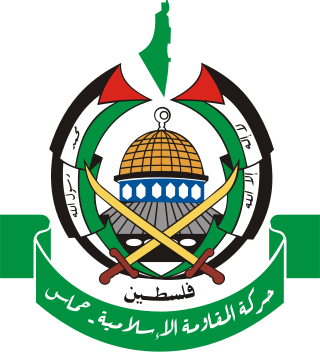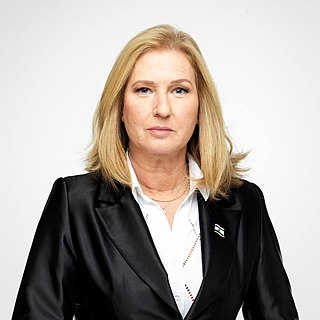Related Research Articles

The Gaza Strip, also known simply as Gaza, is a small territory located on the eastern coast of the Mediterranean Sea; it is the smaller of the two Palestinian territories, the other being the West Bank, that make up the State of Palestine. Inhabited by mostly Palestinian refugees and their descendants, Gaza is one of the most densely populated territories in the world. Gaza is bordered by Egypt on the southwest and Israel on the east and north. The territory has been under Israeli occupation since 1967.

The Islamic Resistance Movement, abbreviated Hamas, is a Palestinian nationalist Sunni Islamist political organisation with a military wing called the Izz al-Din al-Qassam Brigades. It has governed the Israeli-occupied Gaza Strip since 2007.

The Israeli–Palestinian conflict is an ongoing military and political conflict about land and self-determination within the territory of the former Mandatory Palestine. Key aspects of the conflict include the Israeli occupation of the West Bank and Gaza Strip, the status of Jerusalem, Israeli settlements, borders, security, water rights, the permit regime, Palestinian freedom of movement, and the Palestinian right of return.
The one-state solution is a proposed approach to the Israeli–Palestinian peace process. It stipulates the establishment of a single state within the boundaries of what was Mandatory Palestine between 1920 and 1948, today consisting of the combined territory of Israel and the State of Palestine. The term one-state reality describes the belief that the current situation of the Israeli–Palestinian conflict on the ground is that of one de facto country. The one-state solution is sometimes referred to as the bi-national state, owing to the hope that it would successfully deliver self-determination to Israelis and Palestinians in one country, thus granting both peoples independence as well as absolute access to all of the land.

In 2005, 21 Israeli settlements in the Gaza Strip and four Israeli settlements in the West Bank were unilaterally dismantled. Israeli settlers and army evacuated from inside the Gaza Strip, redeploying its military along the border. The disengagement was conducted unilaterally by Israel; in particular, Israel rejected any coordination or orderly hand-over to the Palestinian Authority. Despite the disengagement, the Gaza Strip is still considered to be occupied under international law.
Intermittent discussions are held by various parties and proposals put forward in an attempt to resolve the Israeli–Palestinian conflict through a peace process. Since the 1970s, there has been a parallel effort made to find terms upon which peace can be agreed to in both this conflict and the wider Arab–Israeli conflict. Notably, the Camp David Accords between Egypt and Israel included discussions on plans for "Palestinian autonomy", but did not include any Palestinian representatives. The autonomy plan would later not be implemented, but its stipulations would to a large extent be represented in the Oslo Accords.

Isratin or Isratine, also known as the bi-national state, is a proposed unitary, federal or confederate Israeli-Palestinian state encompassing the present territory of Israel, the West Bank and the Gaza Strip. Depending on various points of view, such a scenario is presented as a desirable one-state solution resolving the Israeli–Palestinian conflict, or as a calamity in which Israel would ostensibly lose its character as a Jewish state and the Palestinians would fail to achieve their national independence within a two-state solution. Increasingly, Isratin is being discussed not as an intentional political solution – desired or undesired – but as the probable, inevitable outcome of the continuous growth of the Jewish settlements in the West Bank and the seemingly irrevocable entrenchment of the Israeli occupation there since 1967.

Tziporah Malka "Tzipi" Livni is an Israeli politician, diplomat, and lawyer. A former member of the Knesset and leader in the center-left political camp, Livni is a former foreign minister, vice prime minister, minister of justice, and leader of the opposition. She is known by some for her efforts to resolve the Israeli–Palestinian conflict.
General elections were held for the first time in the Palestinian territories on 20 January 1996 to elect the President of the Palestinian National Authority (PNA) and members of the Palestinian Legislative Council (PLC), the legislative arm of the PNA. They took place in the West Bank, the Gaza Strip, and East Jerusalem. A new government was formed following the elections, headed by President Yasser Arafat.

Gideon Levy is an Israeli journalist and author. Levy writes opinion pieces and a weekly column for the newspaper Haaretz that often focus on the Israeli occupation of the Palestinian territories. Levy has won prizes for his articles on human rights in the Israeli-occupied territories. In 2021, he won Israel's top award for journalism, the Sokolov Award.
Meron Benvenisti was an Israeli political scientist who was deputy mayor of Jerusalem under Teddy Kollek from 1971 to 1978, during which he administered Israeli-occupied East Jerusalem and served as Jerusalem's chief planning officer. He supported a binational Israeli–Palestinian state.
Censorship in Israel is officially carried out by the Israeli Military Censor, a unit in the Israeli government officially tasked with carrying out preventive censorship regarding the publication of information that might affect the security of Israel. The body is headed by the Israeli Chief Censor, a military official appointed by Israel's Minister of Defense, who bestows upon the Chief Censor the authority to suppress information he deems compromising from being made public in the media, such as Israel's nuclear weapons program and Israel's military operations outside its borders. On average, 2240 press articles in Israel are censored by the Israeli Military Censor each year, approximately 240 of which in full, and around 2000 partially.

Homosexuality in the Palestinian territories is considered a taboo subject; lesbian, gay, bisexual, and transgender (LGBTQ) people experience persecution and violence. There is a significant legal divide between the West Bank and the Gaza Strip, with the former having more progressive laws and the latter having more conservative laws. Shortly after the Jordanian annexation of the West Bank in 1950, same-sex acts were decriminalized across the territory with the adoption of the Jordanian Penal Code of 1951. In the Egyptian-occupied Gaza Strip and under Hamas' rule, however, no such initiative was implemented.

The Israel Policy Forum is an American Jewish organization that works for a negotiated two-state solution to the Israeli–Palestinian conflict through advocacy, education and policy research. The organization appeals to American policymakers in support of this goal and writes opinion pieces that have appeared in many Jewish and non-Jewish newspapers. The organization was founded in 1993.

Tzipura "Tzipi" Hotovely is an Israeli diplomat and former politician who serves as the current Ambassador of Israel to the United Kingdom. She served as Deputy Minister of Foreign Affairs, Minister of Diaspora Affairs, Minister of Settlement Affairs, and as a member of the Knesset for the Likud party.

The Ministry of Intelligence was a government ministry in Israel. It oversaw policies related to the operation of the intelligence organizations, the Mossad and the Shabak, in support of the national security of the State of Israel, in coordination with and under the guidance of the prime minister.

China–Palestine relations, also referred to as Sino–Palestinian relations, encompass the long bilateral relationship between China and Palestine dating back from the early years of the Cold War.

Haneen Zoabi, is a Palestinian-Israeli politician. The first Arab woman to be elected to the legislature on an Arab party's list, she served as a member of the Knesset for the Balad party between 2009 and 2019. In 2021, she was convicted of forgery and fraud after pleading guilty.

Ali Hasan Abunimah is a Palestinian-American journalist who has been described as "the leading American proponent of a one-state solution to the Israeli–Palestinian conflict". A resident of Chicago who contributes regularly to publications such as the Chicago Tribune and the Los Angeles Times, he has served as the vice-president on the board of directors of the Arab American Action Network, is a fellow at the Palestine Center, and is a co-founder of The Electronic Intifada website. He has appeared on many television discussion programs on CNN, MSNBC, PBS, and other networks, and in a number of documentaries about the Israeli–Palestinian conflict, including Collecting Stories from Exile: Chicago Palestinians Remember 1948 (1999).

The two-state solution is a proposed approach to resolving the Israeli–Palestinian conflict, by creating two states on the territory of the former Mandatory Palestine. It is often contrasted with the one-state solution, which is the establishment a single state in former Mandatory Palestine with equal rights for all its inhabitants. The two-state solution is supported by many countries, and the Palestinian Authority. Israel currently does not support the idea, though it has in the past.
References
- ↑ "Dahlia Scheindlin". The Century Foundation. 2024-10-04. Retrieved 2024-11-12.
- 1 2 elad (2024-06-24). "Israel's Democracy and the Prophets of Doom The Crooked Timber of Democracy in Israel, Promise Unfulfilled by Dahlia Scheindlin". The Jerusalem Strategic Tribune. Retrieved 2024-11-12.
- 1 2 3 "It's time to talk seriously about a confederation of Israel and Palestine".
- 1 2 Liat (2018-07-01). "Dr. Dahlia Scheindlin Academic. Journalist. Podcaster". Successful Women of Israel. Retrieved 2024-11-12.
- ↑ "Palestinian-Israeli Pulse: A Joint Poll (2016-2018) Final Report | PCPSR". pcpsr.org. Retrieved 2024-11-12.
- 1 2 3 4 Reiff, Ben (2024-08-30). "'Israelis are frustrated, but do they want to stop the war? Not exactly'". +972 Magazine. Retrieved 2024-11-12.
- ↑ "Dahlia Scheindlin | Foreign Affairs". www.foreignaffairs.com. 2019-02-11. Retrieved 2024-11-12.
- ↑ "Dahlia Scheindlin - The New York Times". www.nytimes.com. Retrieved 2024-11-12.
- ↑ "Dahlia Scheindlin". Haaretz.
- ↑ "Dahlia Scheindlin | The Guardian". www.theguardian.com. Retrieved 2024-11-12.
- ↑ "Dahlia Scheindlin". Time. 2024-01-24. Retrieved 2024-11-12.
- ↑ APN. "Q&A: The America-Israel Dance- Dr. Dahlia Scheindlin (March 25, 2024)". peacenow.org. Retrieved 2024-11-12.
- ↑ "Two States or One? Reappraising the Israeli-Palestinian Impasse". Carnegie Endowment for International Peace. Retrieved 2024-11-12.
- ↑ Iraqi, Amjad (2023-09-12). "The contradictory afterlives of Oslo". +972 Magazine. Retrieved 2024-11-13.
- ↑ Scheindlin, Dahlia (2023-11-12). "Israel: The Left in Peril". The New York Review of Books. Retrieved 2024-11-12.